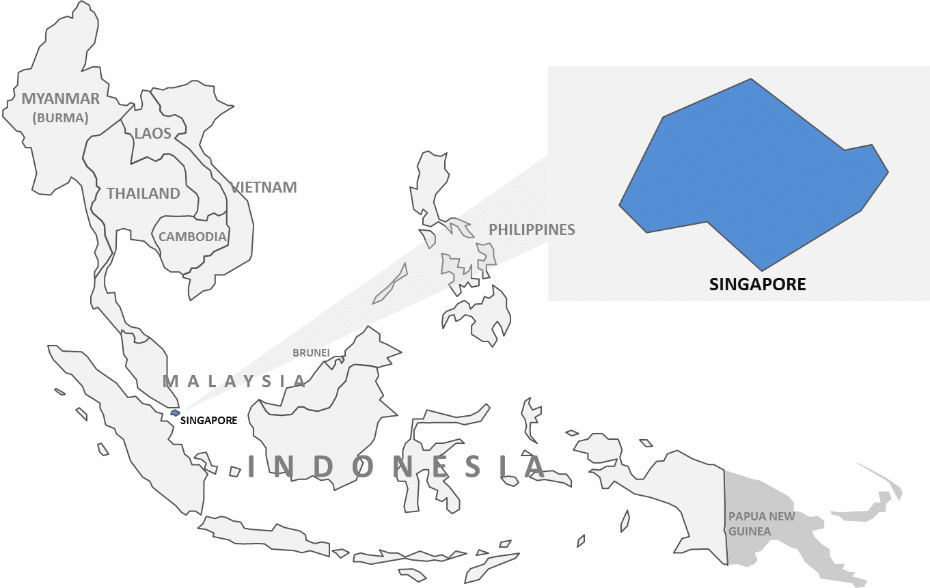Singapore is a small, multi-cultural and cosmopolitan city-state of 5.5 million people, in the very heart of South East Asia. It is a thriving trade, manufacturing and financial hub with one of the highest per capita GDP in the world at USD 65,233 in 2019. The economy was valued at USD 356.9 billion in 2019.
The country has pursued an outward-looking, export-oriented economic policy that encourages a two-way flow of trade and investment. This has enabled Singapore to become a global trading hub with a trading capacity almost three times its GDP – it has one the world’s highest trade-to-GDP ratios.

The country has inked bilateral trade deals with the US, Japan, Australia, New Zealand, South Korea, China, India, Jordan, Turkey, the European Union, the European Free Trade Association and the Gulf Cooperation Council. Singapore is also a member of the ASEAN Free Trade Area (AFTA). ASEAN has FTAs with China, India, Japan, South Korea, Australia and New Zealand. Singapore is a party to the Comprehensive and Progressive Agreement for Trans-Pacific Partnership (CPTPP).
Singapore is considered to be a strategic starting point for global enterprises seeking business opportunities in Asia. The country’s location – it is within a six-hour flight time from any South East Asian country as well as India and China – means that it is an ideal hub from which companies can access the region.
Singapore is ranked 2nd in the World Bank’s Ease of Doing Business Index and 4th in Transparency International’s Corruption Perceptions Index for 2019, reflecting the ease of setting up operations here and the corruption-free environment.
The city also offers significant benefits to companies looking to establish a regional headquarters in the country, in terms of corporate taxation and economic incentives for R&D and innovation. Good governance has given rise to some of the world’s finest infrastructure, including sophisticated telecommunications networks, extensive public transportation, well-managed healthcare and education, and modern air and seaport facilities.
Major industries in Singapore include electronics, financial services, petrochemicals, pharmaceuticals, biotechnology, food and beverage, aerospace and ship repair. Singapore has also become an important financial, trade and wealth management hub for the South East Asian region and a global hub for currency and commodity trading, transshipment and oil and gas refining.
Singapore has some significant clusters worth targeting. There is a large petrochemical industry here and the city is a hub for oil & gas equipment and services. Around 10% of the aerospace MRO output in the world comes out of Singapore. The city-state has a world-leading marine sector and has a vibrant ecosystem of logistics firms and shippers.
Large commodity trading companies are based in Singapore. Singapore is also one of the top financial centers in the world and has developed into a hub for Fintech and Regtech innovation.
Singapore is an early adopter of technology, thanks to the government’s effort to turn the country into the technology hub of Asia, and its investments into digital capabilities and initiatives. The city’s Smart Nation initiatives aim for digital technology driven transformation in domains such as health, transport, urban solutions, finance, and education.
In conclusion, we would like to highlight the following for foreign companies exploring market entry into Singapore:
- Companies looking to do business in Singapore can expect integrity, adaptability and respect for intellectual capital to be emphasized upon by a strategic-minded administration, which is attuned to the needs of companies to protect invention and innovation. Singapore also ranks as the most livable city for expatriates due to its excellent infrastructure and amenities, low crime-rate, and cleanliness, among others.
- Singapore has a highly educated and skilled workforce proficient in English. Fresh graduates took home a median gross monthly salary of SGD 3,600 (USD 2,648) in 2019. Though salaries in Singapore are much higher than other countries in the region, productivity levels and the business culture in Singapore tends to be more aligned with the culture at multinational companies. It should be noted that Singapore has implemented workforce training programs to reskill unemployed PMET (Professionals, Managers, Executives and Technicians), which can defray up to 90% of a locally employed person’s salary up to a maximum of SGD 6,000 (USD 4,200) per month, for 9 months or even up to a year. That can be a significant saving for a company in their first year.
- Singapore has become a very important location for arbitration and mediation. It is not unusual to find companies including Singapore in their contracts as the location for mediating disputes, even if the work is being undertaken outside of Singapore.
- Some detractors say the size of the Singapore market is too small, while the cost of doing business too high. But as mentioned above, depending on the business and plans, Singapore could play a key role in a company’s overall Asia strategy. Often closing a deal in Thailand, or in Vietnam, or even in China, is decided out of Singapore. This is because many companies have their regional head-offices in Singapore, where the decision making happens.
If you are interested in learning more about market opportunities in Singapore, Orissa International can assist you. With our headquarters in Singapore and offices in Malaysia, Indonesia, Philippines, Thailand and Vietnam, we have been helping companies with market entry and expansion in Southeast Asia for 23 years. Please fill out the form to contact us.

